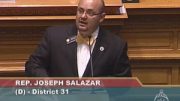By Jeffrey A. Roberts
CFOIC Executive Director
A Denver resident is suing Mayor Michael Hancock and the city over the withholding of records about an advisory group formed to examine single-family housing rules.
Florence Sebern wants a Denver District Court judge to determine whether the mayor’s office properly invoked the deliberative process privilege in the Colorado Open Records Act (CORA) to deny her request for documents concerning the Group Living Advisory Committee.

The deliberative process privilege requires state and local government entities to withhold certain records “if the material is so candid or personal that public disclosure is likely to stifle honest and frank discussion with the government.” A government records custodian who invokes the privilege must explain why disclosure of the records “would cause substantial injury to the public interest.”
In August, Sebern submitted a CORA request for “all materials (emails, attachments, lists, documents, memos) regarding the authority for, and creation and appointment of the Group Living Advisory Committee.” A city records custodian identified five emails, with attached documents, responsive to Sebern’s request and eventually provided her with a notarized statement as to why the records should not be disclosed. But the statement “employs boilerplate provisions that fail to establish why each document’s disclosure would substantially impair the public interest,” Sebern’s lawsuit contends.
Meeting from March 2018 to summer 2020, the advisory committee “helped evaluate existing regulations and provide insight into community needs and potential solutions,” according to the city’s website. It initially proposed increasing the number of unrelated adults who can legally share a single-family home from two to at least eight, Denverite reported, but the number was reduced to five for most homes after a series of public hearings. A Denver City Council committee is scheduled to vote on the plan later this month.
Sebern’s lawsuit, filed by Boulder attorneys Robert Gunning and Eric Maxfield, argues that disclosure of the requested records “will greatly enhance public scrutiny” of a zoning code amendment process that could increase density in Denver’s single-family neighborhoods. It notes that the 48-member committee included some planners, developers, service providers “and representatives of organizations that stand to commercially gain from the proposed Zoning Code amendment.”
“The requested documents will shed considerable light on the formation of the Group Living Advisory Committee, including the criteria used to select the 48 members,” the complaint adds. “The disclosure of this information before the City Council hearing(s) on the Amendment will foster transparency, accountability, and improve the decision-making process.”
Because the advisory committee has completed its work, the passage of time “lessens the likelihood that disclosure (of the requested records) will cause substantial injury to the public interest by stifling frank and honest discussion,” the lawsuit contends.
“The City intends to defend its statutorily protected deliberative process vigorously,” said Theresa Marchetta, director of strategic communications and media policy for Hancock’s office, in an emailed statement to the Colorado Freedom of Information Coalition.
Follow the Colorado Freedom of Information Coalition on Twitter @CoFOIC. Like CFOIC’s Facebook page. Do you appreciate the information and resources provided by CFOIC? Please consider making a tax-deductible donation.




